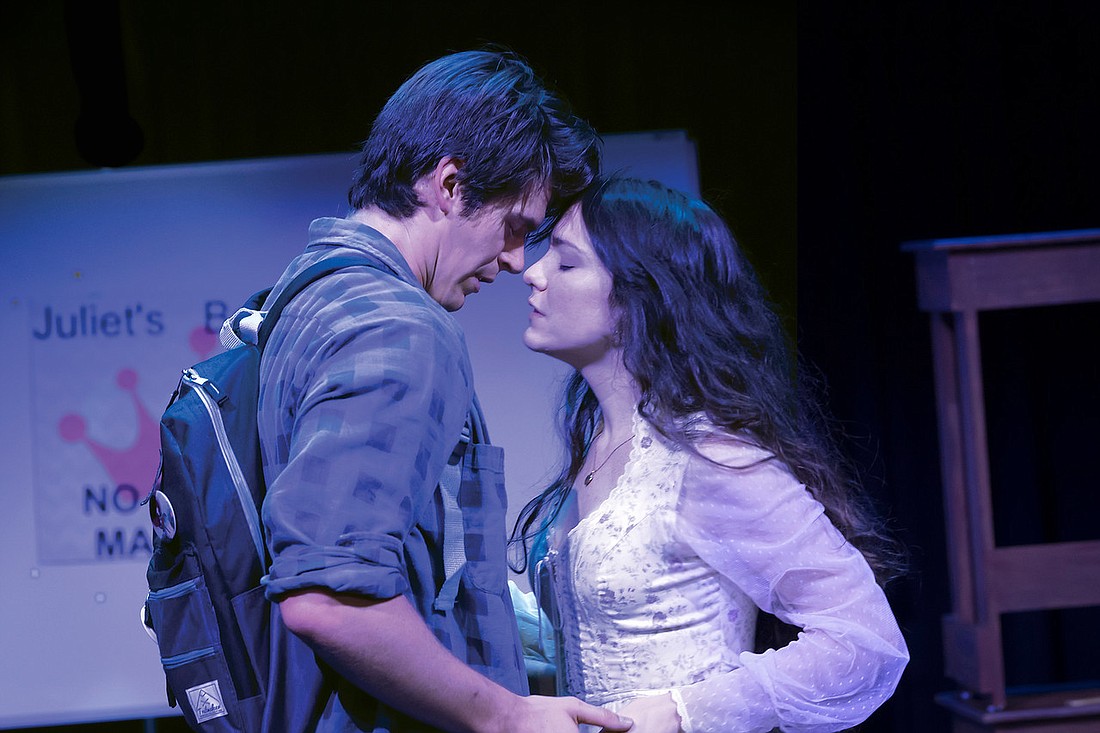- May 24, 2025
-
-
Loading

Loading

Every year, the FSU/Asolo Conservatory boils down a Shakespearean classic and takes it on the road across Florida. The stripped-down show goes on with a cast of the Conservatory’s third-year acting students; high school students are the primary audience. “Romeo & Juliet” is its 2019 touring production.
The play is a natural choice for young audiences. And a tough choice for editors. Shakespeare’s original clocks in at about three hours. Tyler Dobrowsky distilled the script to a mere 45 minutes; getting to the heart of the play is his goal. How does he define that heart? Dobrowksy’s cuts hinge on that editorial judgment. Here’s my take on his take.
Stripped of sentimentality, “Romeo & Juliet” is a portrait of two naive, hormone-fueled teenagers in 12th century Verona, Italy. They’re not bad, just young — and youth is their original sin. (The text is clear that Juliet is 13 years old. Romeo is probably around 16.) Their passions put them on a collision course with a brutal social order. They fell in love at first sight. The poor kids still think love conquers all, but their feuding families don’t see it that way.
Dobrowsky’s condensed version starts out with a comic tone. The setting is a classroom with rows of desks and a blackboard. The teachers going to get into “Romeo and Juliet” yawn. But pedagogy soon melts into performance. The play begins as farce. The laughter almost makes you forget the inevitable tragedy.
Dobrowsky directs with a snappy pace. His script is a highlight reel of the play’s big moments, including the balcony scene, the Queen Mab speech and various duels. There’s never a dull moment, though many good moments don’t make the cut.
Seven talented, third-year conservatory actors bring it all to life. Michael Judah and Jillian Cicalese are heartbreaking in the lead roles. They’re two likable kids who don’t know what’s coming. (You do, but there’s no way to warn them.) Jonathan Grunert’s Mercutio is a swaggering bad boy. Joe Ferrarelli’s Tybalt is more of a humorless aristocratic thug. Brian Ritchie is hilarious as the incompetent Friar Laurence. (No kidding. If you give one lover a potion to fake their death, make sure to let the other lover know.) Alex Pelletier is also a hoot as Juliet’s bawdy nurse. Carla Corvo is a commanding presence as Lady Capulet, the lone matriarchal authority figure.
Olivera Gajic’s costumes make the 1390s look like the 1990s. Her Verona has a distinctly grungy look — lots of flannel and flair. Frank J. Paul's set takes a theater-in-a-trunk approach. It’s cleverly designed to be packed and unpacked, again and again. A Spartan classroom seems limiting, but Paul uses it as springboard for imagination. Kudos also to Mark Rose’s fight choreography. He makes the battles look improvised and in-the-moment, when every move is obviously planned.
Pronouncing a critical judgment isn’t easy. With this production, the play’s not the thing. It’s designed to create a thirst for theater in the next generation. Does it work?
Shakespeare’s play is a pocket universe. Dobrowsky doesn’t try to shoehorn its many worlds into a 45-minute run time. He focuses on the tragic love story — the most relatable element to teenagers. I haven’t been a teenager for a while, at least not in this century. But my inner teenager could definitely relate. My inner adult wanted to get the whole story.
That works for me.